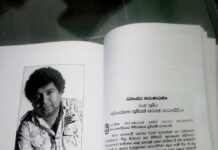(A) ඉන්දීය ජාතික දේශපාලනයෙන් ශ්රී ලංකාවේ දෙමළ පීඩිත මිනිසා නිදහස් කිරීමට LTTEය රජිව් ගාන්ධි ඝාතනය කළේය.
(B) මහින්ද රාජපක්ෂ තම පවුලේ ‘ප්රාග්ධනය’ සමුච්ඡ කිරීම සදහා LTTEය විනාශ කළේය. (ධනවාදය වෙනුවට පුද්ගලික ප්රාග්ධනය)
(C) ඉන්දියාවට පාලනය කළ නොහැකිව තිබූ ශ්රී ලංකාවේ දේශපාලන ලීවරය වු LTTEය අවසාන වීමෙන් පසුව යළිත් ශ්රී ලංකාවේ ජාතික දේශපාලනය තුළ ඉන්දියානු සාධකය අධිනිශ්චය විය. (විජේවීරගේ ඊනියා ඉන්දීය උප- අධිරාජ්යවාදය)
(D) ඉන්දියාව කුමන්ත්රණයක් හරහා මහින්ද චින්තනය පරාජය කිරීම. නන්දිකඩාල් යනු ප්රභාකරන්ගේ පමණක් නොව මහින්දගේද අවසානය බව කිසිවකු එදා දුටුවේ නැත.
(E) ප්රජාතන්ත්රවාදී ප්රතිසංස්කරණ වෙනුවෙන් මහින්දගේ ආණ්ඩුව යුගයේ අරගල කළ ‘කොළඹ සිවිල් සමාජය’ ද ඉන්දීය උගුලේ කොටසක් වූ ඇමරිකන් ගෞතම්වාදයේ සල්ලි බෙදීම නිසා නන්නත්තාර විය. ගෞතම් වීථි සටන්කරැවන්ට සල්ලි බෙදීම නිසා වීථි සටන්කරැවන් පොදු සතුරාට පහරදීම වෙනුවට තමාටම පහර දුන්නේය.
F) ඉදිරියට කුමක් කළ යුතු දැයි කිසිවකු නොදන්නා අතර ඉස්සර විපක්ෂ නායක දැන් අගමැතිතුමා මොනිටර් කෙනෙකු බවට පත්වී ඇත.
(G) දැන් ගෞතම් සල්ලි බෙදන්නේ නැත. ඔහුට දැන් Projects අවශ්යය.





















Dialectic ….the Hegelian process of change in which a concept or its realization passes over into and is preserved and fulfilled by its opposite… development through the stages of thesis, antithesis, and synthesis in accordance with the laws of dialectical materialism ….any systematic reasoning, exposition, or argument that juxtaposes opposed or contradictory ideas and usually seeks to resolve their conflict …
….the dialectical tension or opposition between two interacting forces or elements.”
“Dialectical Materialism … 1 : the Marxist theory that maintains the material basis of a reality constantly changing in a dialectical process and the priority of matter over mind.”
“Hegel’s dialectic often appears broken up for convenience into three moments called “thesis” (in the French historical example, the revolution), “antithesis” (the terror which followed), and “synthesis” (the constitutional state of free citizens). … Much Hegel scholarship does not recognize the usefulness of this triadic classification for shedding light on Hegel’s thought. Although Hegel refers to “the two elemental considerations: first, the idea of freedom as the absolute and final aim; secondly, the means for realising it, i.e. the subjective side of knowledge and will, with its life, movement, and activity” (thesis and antithesis) he doesn’t use “synthesis” but instead speaks of the “Whole”: “We then recognised the State as the moral Whole and the Reality of Freedom, and consequently as the objective unity of these two elements.” …
“Hegel used this system of dialectics to explain the whole of the history of philosophy, science, art, politics and religion, but many modern critics point out that Hegel often seems to gloss over the realities of history in order to fit it into his dialectical mold….
In the 20th century, Hegel’s philosophy underwent a major renaissance. This was due partly to the rediscovery and reevaluation of him as the philosophical progenitor of Marxism by philosophically oriented Marxists, partly through a resurgence of the historical perspective that Hegel brought to everything, and partly through increasing recognition of the importance of his dialectical method. The book that did the most to reintroduce Hegel into the Marxist canon was perhaps Georg Lukacs’s History and Class Consciousness. This sparked a renewed interest in Hegel reflected in the work of Herbert Marcuse, Theodor Adorno, Ernst Bloch….
Comments are closed.